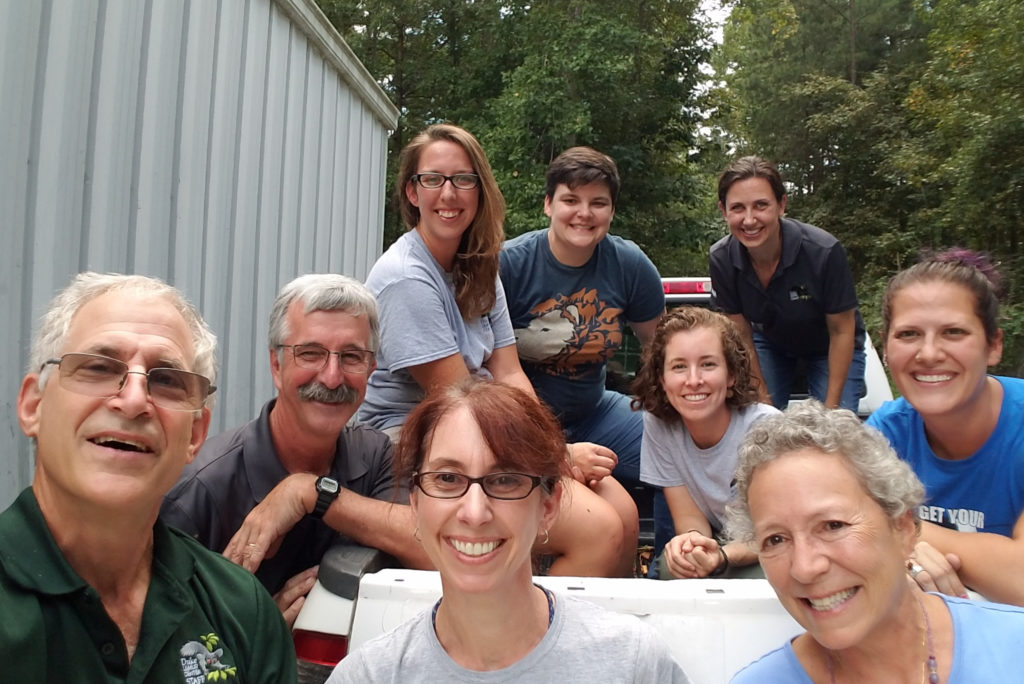
DLC staff from across departments – animal care, research, behavioral, veterinary, and conservation – all lend a hand preparing the center for the arrival of Florence.
By Sara Clark. Photos by DLC staff.
THANK YOU to everyone who has expressed concern for the safety of the DLC’s lemurs and staff as we prepare for the arrival Hurricane Florence. We feel so cared for and loved! We’re taking every precaution to ensure the well-being of all of the primates – human, loris, and lemur alike – who’ll be staying onsite during the storm, and we are so grateful for your care and support!
As part of its accreditation through the Association of Zoos and Aquariums (AZA), the Duke Lemur Center has severe weather Standard Operating Procedures (SOPs) already in place. “Our SOPs were thought through well before the storm, then improved further after every severe weather event,” explains Greg Dye, Director of Operations and Interim Director of the Duke Lemur Center. “We know how to approach these storms, and our staff is trained, talented, and committed. We’re going to be okay.”
Learn more below about the specific ways the DLC is preparing its irreplaceable colony of endangered lemurs for Florence’s arrival this Thursday.
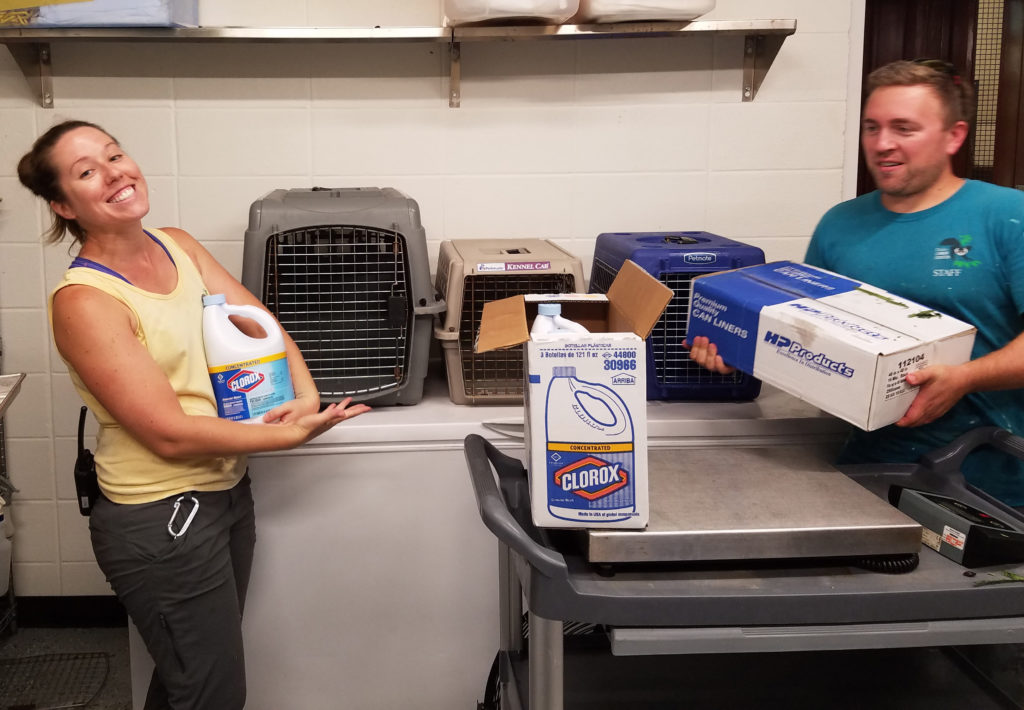
On Tuesday, Primate Technicians Jodi and Matt move essential supplies into AtyAla, one of the DLC’s animal housing buildings. Kennels have been moved into the buildings as well, to provide emergency transport if a fallen tree compromises the integrity of a section of housing.
Monday through Wednesday
DLC staff have been working hard over the past 48 hours to implement our hurricane preparation plans and will have everything ready by end of the day Wednesday.
“The critical part of the planning process is 72 hours out,” explains Dye. “We have to be self-sustaining through the storm. Everything we need – all of those resources and supplies – has got to be onsite before Florence hits.”
On Monday, the DLC’s animal care and veterinary teams inventoried critical supplies and ordered what would be needed onsite during the hurricane and the days immediately following. A double order of vegetables and fruits has been delivered from the DLC’s supplier, FreshPoint, ensuring a minimum four-day supply on hand when the hurricane hits. The center’s dry storage areas are stocked with several weeks’ worth of nutritionally complete primate chow, and on Wednesday, husbandry staff will cut four days’ worth of browse (fresh leaves critical to the digestive health of Coquerel’s sifakas). Water barrels have been filled and stored inside the DLC’s five animal housing buildings, where they will provide enough water for the lemurs for four days.
Waterproof flashlights, batteries, ponchos, headlamps, and other supplies generously donated via the DLC’s Amazon Wishlist will arrive Wednesday, ensuring that the animal care team stays safe and dry while making rounds caring for the lemurs. Because staff will need to navigate outdoors in high wind, all signs, banners, tents, and other hazards are being removed.
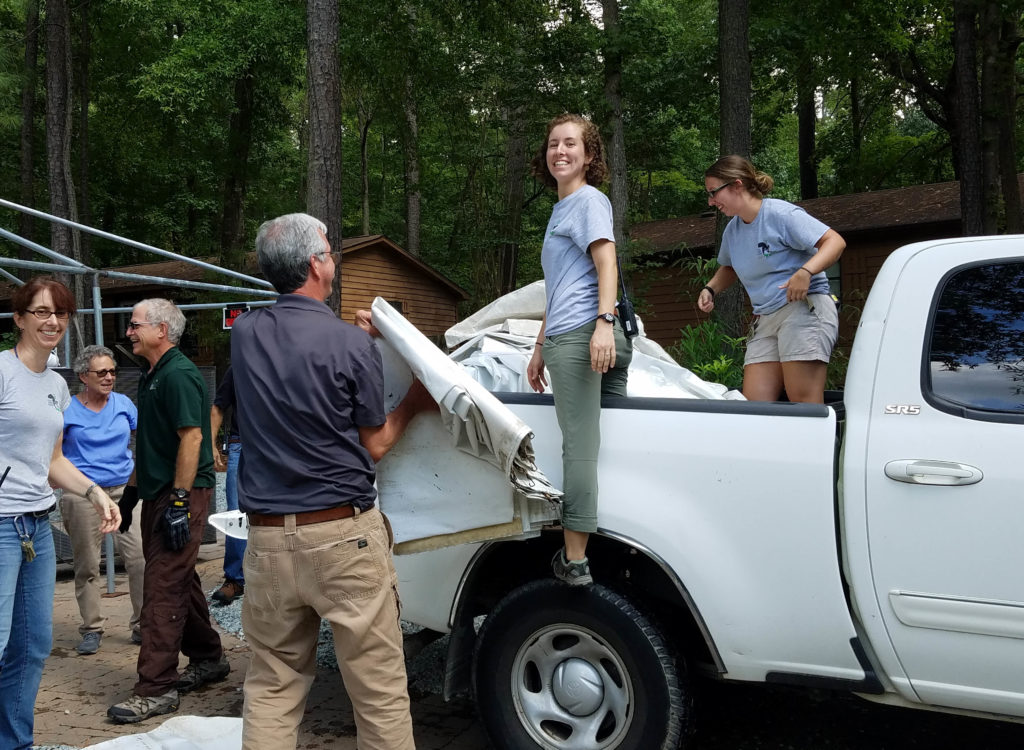
On Tuesday afternoon, the DLC’s event tent is disassembled and moved into storage. To ensure the safety of staff navigating outdoors in high wind, all signs, banners, and other hazards are being removed from the grounds.
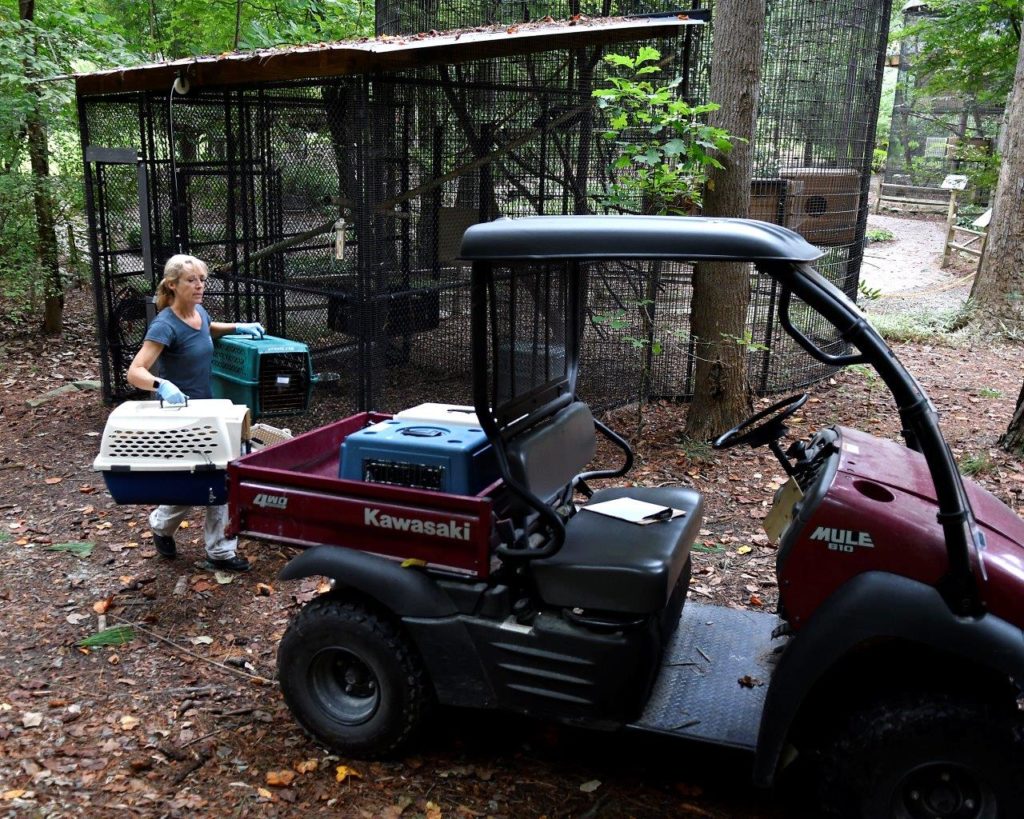
Early Wednesday morning, Primate Technician Supervisor Britt Keith moves lemurs from the “silos” on the summer tour path to the safety of the Miaro building to weather the storm.
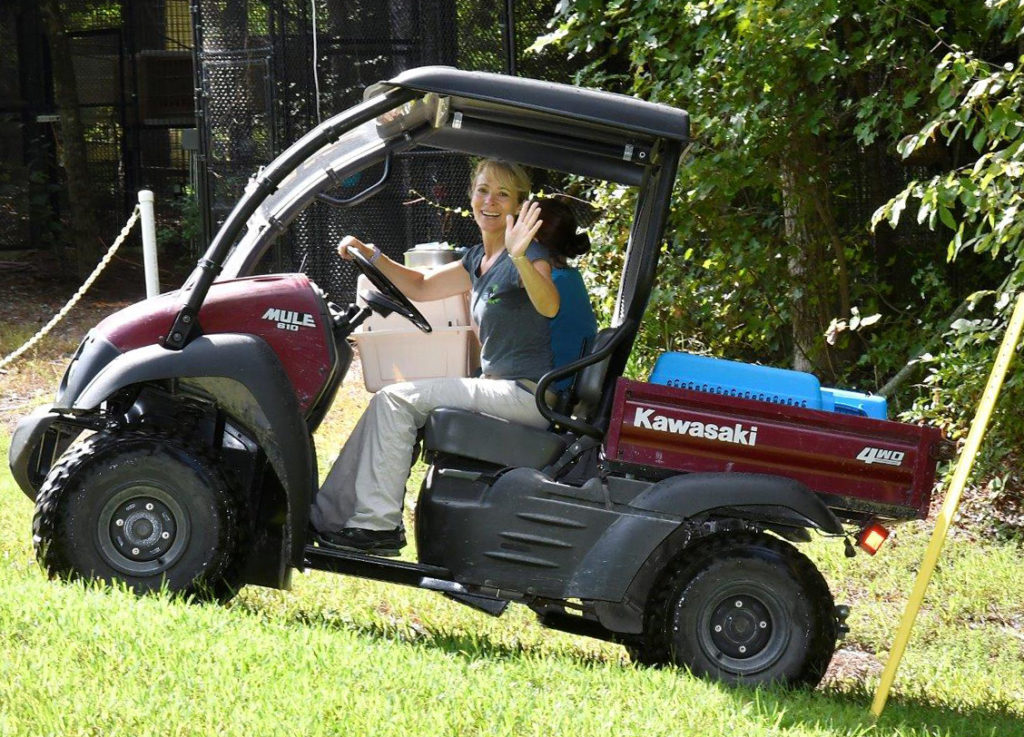
And away they go to the lemurs’ warm, dry buildings!
Thursday through Sunday
Because the soil is already saturated by recent thunderstorms, fallen trees are a major threat. “Our weather concerns start Thursday evening,” says Dye. “Friday is going to be the critical day. Once the sun comes up, we’ll have to assess how bad things look.”
Veterinary and animal care staff will stay in the Lemur Center’s onsite cabin – typically reserved for visiting researchers – from Thursday onward, ensuring continuous access to the animals, even if roads become impassable. “Our staff has two families they’re prepping for the hurricane: their human families and the lemurs under their care,” says Dye. “During the hurricane, they’ll be here alongside the lemurs… That’s an amazing level of commitment that separates us from a lot of other jobs. It’s incredible.”
The DLC’s near neighbors, Duke Forestry, have four staff on reserve to clear Lemur Lane of any downed branches and trees, restoring access to the Lemur Center as quickly as possible. All four staff will take chainsaws home on Thursday as a precaution. “We’re prepared to cut our way in on Friday,” says Sara Childs, Director of the Duke Forest.
In addition to impassable roads, “our biggest risk is no electricity,” says Dye. “The Lemur Center is located on 80 acres of forest, so downed power lines are a real possibility.”
The main building (where the DLC’s veterinary hospital is located) and all animal housing areas are equipped with back-up generators, which have been fueled with enough gasoline for three days’ continuous running. “They’re filled, tested, and ready to go,” says Dye.
A smaller, portable Honda generator donated by Cloud Mania, LLC will arrive Thursday morning, giving the DLC’s maintenance staff the ability to power saws and other tools on the grounds away from the buildings – essential for tree removal and fenceline repairs inside the DLC’s forested Natural Habitat Enclosures (NHEs). The small generator will also provide emergency portable back-up power for the veterinary team.
By 1:45 PM on Tuesday, all free-ranging lemurs had been brought indoors, where they’ll stay safe and dry during the storm and its aftermath. No animals will be released back into the forest until husbandry and maintenance staff can check and repair the fencelines around the NHEs’ perimeter. By Wednesday, lemurs in the “silo” enclosures along the summer tour path will be securely indoors as well.

A hurricane preparedness briefing during Tuesday’s all-staff meeting.
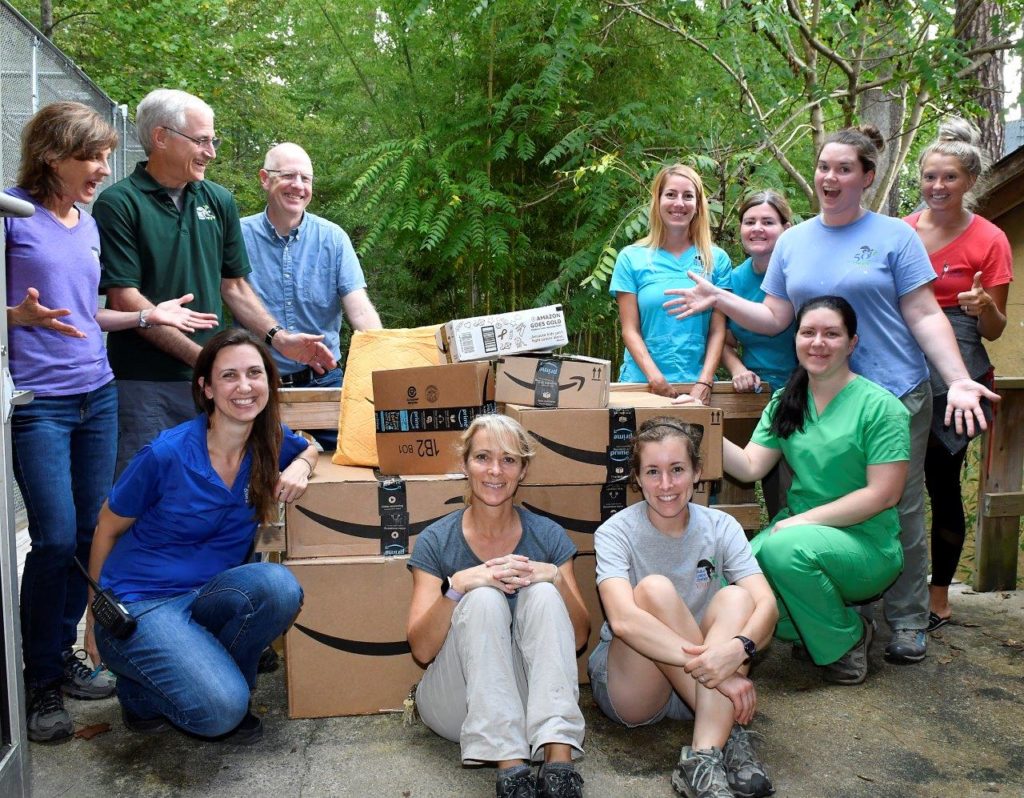
Waterproof flashlights, batteries, ponchos, headlamps, and other supplies generously donated via the DLC’s Amazon Wishlist arrived Wednesday afternoon, ensuring that the animal care team stays safe and dry while making rounds caring for the lemurs.
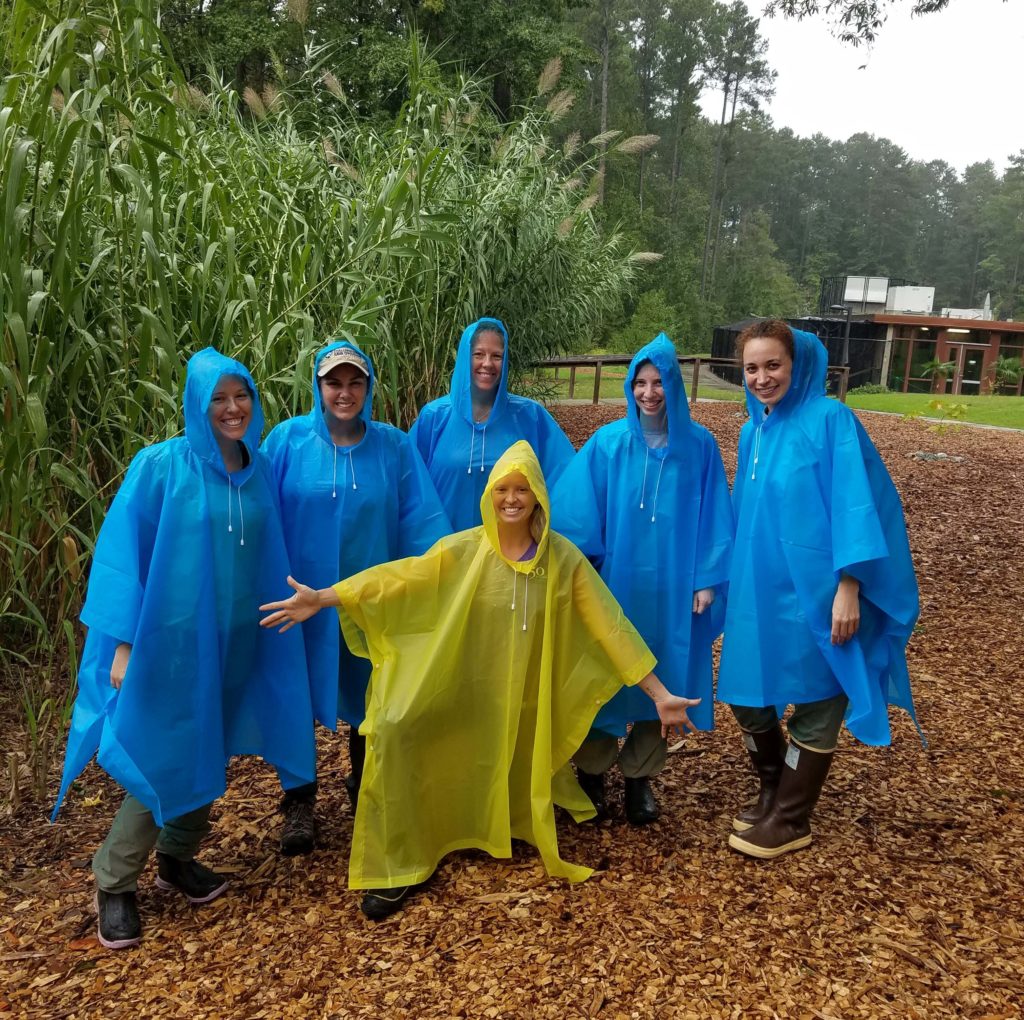
On Friday, Primate Technicians Brittany, Jodi, Danielle, Melanie, Liz, and Jenna model their new hurricane wear. Thanks, donors!
Tours and events
The Duke Lemur Center will be closed to the public from Wednesday, September 12 through Sunday, September 16. While essential animal care, veterinary, and maintenance staff will be onsite to ensure the lemurs are well cared for, all other staff – including the tour department – will stay home.
The Mission: Madagascar fundraiser has been rescheduled for Saturday, October 6. We have reopened ticket sales and would be extremely appreciative of your support if you’re able to join us! All ticket purchases and donations provide much-needed funding for the DLC’s conservation work “on the ground” in Madagascar. Tickets for the October 6 event can be purchased here.
Most people don’t realize that while the Duke Lemur Center operates as a part of Duke University, more than half of our operations rely on contributions from individuals, businesses, and grant providers. Unrestricted donations are critical to the DLC’s priority needs like these unexpected hurricane necessities. We appreciate any and all donations!
Update and images
See how we’re weathering the storm! Read our update HERE.
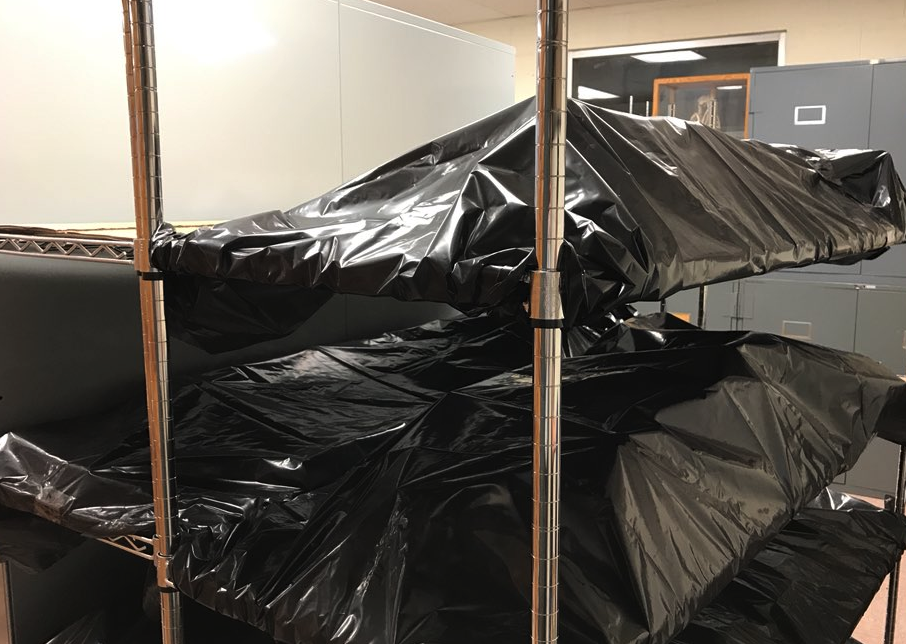
Prepping fossils at the DLC’s Division of Fossil Primates for the arrival of Hurricane Florence. They’ve made it 37 million years. They’ll make it through this!

